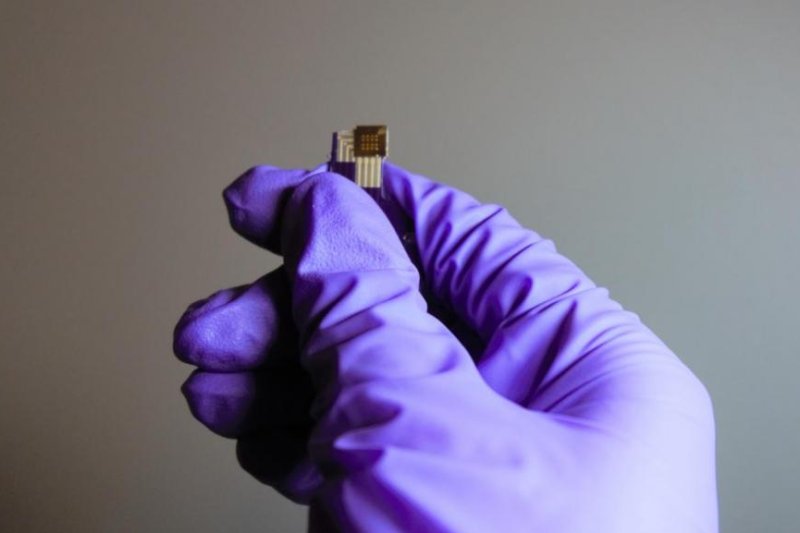By adding a photon to a quantum material, scientists produced by a new kind of hardware component for artificial intelligence. Photo by
Qi Wang/Purdue University
May 7 (UPI) -- Artificial intelligence requires a lot of energy. Simply solving a puzzle can require the equivalent of the energy produced by three nuclear plants in a single hour.
To make artificial intelligence more energy efficient, a team of researchers led by material scientists and computer engineers at Purdue University set out to lend hardware the kind of intelligence typically reserved for software.
"Software is taking on most of the challenges in AI," Shriram Ramanathan, a professor of materials engineering at Purdue, said in a news release. "If you could incorporate intelligence into the circuit components in addition to what is happening in software, you could do things that simply cannot be done today."
In a new study, scientists describe the development of a new type of hardware component made from a quantum material, a material with optical and electrical properties that can't be explained by classical physics.
As detailed Thursday in the journal Nature Communications, the new quantum material demonstrated artificial "tree-like" memory at room temperature. Previously, scientists have only been able to demonstrate such hardware intelligence at impractically low temperatures.
Tree-like memory, commonly employed by artificial intelligence software, recalled the branch-like informational organization of the brain. Acquired knowledge or data is stored in a branch-like fashion, allowing easy retrieval when learning new skills.
"Humans memorize things in a tree structure of categories. We memorize 'apple' under the category of 'fruit' and 'elephant' under the category of 'animal,' for example," said Hai-Tian Zhang, a postdoctoral fellow in Purdue's College of Engineering. "Mimicking these features in hardware is potentially interesting for brain-inspired computing."
To create their new quantum hardware component, scientists added a proton to neodymium nickel oxide. When they supplied the material with an electric pulse, they watched the electricity move around the proton.
As the proton moves around, it creates new states of electric resistance, yielding information storage sites known as memory states. Using multiple electric pulses, researchers were able to produce a branch of memory states.
"We can build up many thousands of memory states in the material by taking advantage of quantum mechanical effects," Ramanathan said. "The material stays the same. We are simply shuffling around protons."
When scientists simulated the quantum properties of the new material, they determined it was capable of learning the numbers 0 through 9, a baseline proof of artificial intelligence. The discovery suggests quantum hardware could assume some of the informational processing responsibilities of artificial intelligence software.
"This discovery opens up new frontiers for AI that have been largely ignored because implementing this kind of intelligence into electronic hardware didn't exist," Ramanathan said.
The discovery could also pave the way for the integration of human and artificial intelligence.
"Protons also are natural information transporters in human beings," Zhang said. "A device enabled by proton transport may be a key component for eventually achieving direct communication with organisms, such as through a brain implant."















